 Slow. I love this word, and yet it tends to have many negative connotations in education. Which is too bad because it’s the very philosophy we need to save our education system, and give kids the time and space necessary to grow into the thoughtful, articulate citizens we desperately need them to become.
Slow. I love this word, and yet it tends to have many negative connotations in education. Which is too bad because it’s the very philosophy we need to save our education system, and give kids the time and space necessary to grow into the thoughtful, articulate citizens we desperately need them to become.
The 20th Century was known for many things. Mass destruction, of course. Statistics show we managed to destroy each other and plunder the planet at a rate unequalled by any other century in history. The 20th Century was also a time of great exploration, innovation and technological advance. The exploration of space. The eradication of disabling and fatal diseases. Increased global awareness. A measure of equality for at least some groups who have been historically disenfranchised.
But the thing that stands out most vividly to me about the 20th Century is the emergence of what Canadian journalist Carl Honoré describes as “the cult of speed.” As speed has become an absolute good in the eyes of many, slow ways of life have largely disappeared. Many see them as ancient, naive, or largely impractical.
Instead, we live in an instant world, where most often if you ask someone how they are, the reply is busy, as if that response alone justifies one’s existence on the planet. Few people stop to ask if what we’re so busy doing is actually worth the energy we’re expending.
According to Honoré, fast and slow “are shorthand for ways of being, or philosophies of life.”
Fast is busy, controlling, aggressive, hurried, analytical, stressed, superficial, impatient, active, quantity-over-quality.
Slow is the opposite: calm, careful, receptive, still, intuitive, unhurried, patient, reflective, quality-over-quantity. It is about making real and meaningful connections with people — culture, work, food, everything.
Unfortunately, our education system, at least in North America, has been deeply influenced by the “need for speed”, or what sociologist George Ritzer has termed “McDonaldization” – that is, “the process by which the principles of the fast food industry are coming to dominate more and more sectors of the world.”
Ritzer outlines four characteristics of this mechanistic worldview: efficiency, predictability, calculability (quantifiable results) and control – or at least the illusion of control.
The fast school system
In education, McDonaldization attempts to wipe out any of the messiness or inefficiencies of learning. Instead, it attempts to reduce it to a commodity that can be packaged, marketed and sold. Rather than cultivating a deep, holistic love of learning that touches every aspect of a student’s life, learning is reduced to an assembly line. As we allow this to happen, we impose a mechanistic view of learning (which, in nature, is largely an organic process) and at a great cost.
 Our education systems continue to rapidly adopt short-cuts that reflect the dimensions of McDonaldization. Essentially, this imposition seeks the most efficient (read: easiest and cheapest) way to get a student from kindergarten to grade 12. In an assembly line, things are homogenized as much as possible. In education, we tend to see this in the assumption that the most important thing a group of kids have in common is the year they are born.
Our education systems continue to rapidly adopt short-cuts that reflect the dimensions of McDonaldization. Essentially, this imposition seeks the most efficient (read: easiest and cheapest) way to get a student from kindergarten to grade 12. In an assembly line, things are homogenized as much as possible. In education, we tend to see this in the assumption that the most important thing a group of kids have in common is the year they are born.
Efficiency has also the birthed the idea that educators can be better utilized by coupling them with online services like Khan Academy, somehow justifying the ridiculous class sizes that many teachers now have to deal with. I don’t doubt that the Khan Academy can transmit information, but can it help to develop our children into thoughtful , ethical citizens, who can critically evaluate, rather than being swayed by the flavor of the day?
Does this cut-to-the-chase strategy create better citizens or compliant consumers? When learning is treated as one more product to be consumed, a horrible disconnect occurs in our students. It becomes about the mark or grade point average. It becomes about the diploma. It becomes about the end justifying a lot of terrible means.
And if a student is not quite ready to read when reading is “introduced,” if they mess with the efficiency and control of the system, then they often pay the price for being “too slow” throughout rest of their lives. Kids are labelled as being not “academic,” as if being academic is the most important quality a child can possess. Creativity is quashed. Curiosity is quelled. Disengagement is rampant.
The desire for predictability produces the one-size-fits-all curriculum and the one-way-works-for-everybody instructional model. Every student will display the same skill (or regurgitation of content knowledge) at the same time. To calculate if any of this is making a difference, a system of high stakes testing is introduced. If students fail, the system is seldom questioned – it’s the fault of poor implementation, inadequate teaching or impaired learners.
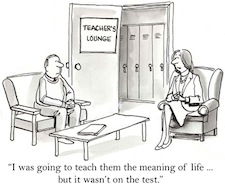 In some schools, of course, test scores are up (whatever that means). But at what price? Our students are increasingly stressed and disengaged from their learning. They can jump through the hoops, but most have little idea what they’re passionate about, beyond mindless distractions. How would they know?
In some schools, of course, test scores are up (whatever that means). But at what price? Our students are increasingly stressed and disengaged from their learning. They can jump through the hoops, but most have little idea what they’re passionate about, beyond mindless distractions. How would they know?
It’s not clear what the long term costs of all of these methods will be, but many teachers would agree that they will be dire. What does it do to a child to spend 12 years stressed out by tests or not measuring up to an arbitrary standard that’s largely unrelated to the way the human mind functions?
If educators and parents sense that something is wrong, why do they continue to support such a system? Fear. Fear of losing one’s job. Fear of losing funding. Fear of embarrassing test results being published. Fear of one’s child not being able to get into college and land a “good” job.
There’s an awful lot of fear in education today, and the truth is, we have no idea what the long term cost of this fearful environment will be. We know in the short term, we lose a lot of new teachers in the first five years. We know that others quit early or need stress leave. We know that many are dispirited and cannot hide this from their students.
So how do we change all of this insanity?
Enter the slow education movement
For awhile now, I’ve been researching and thinking deeply about the idea of slow education. The slow food movement is a grass roots concept that began in 1989 in Italy. Over the past 25 years, it has branched out to other areas of life that have been co-opted by speed and efficiency.
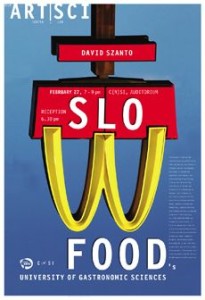 The Slow Food movement bypasses the industrial food conglomerates and seeks to reconnect citizens to the richness of a common life with the neighbors who grow and prepare our food. Slow movements (slow cities, slow travel, slow parenting, slow living & more) are a call for intentionality, an awareness of our mutual interdependence with all people and all creation. They seek to root people in community – where we spend time caring and sharing, talking and doing things for one another.
The Slow Food movement bypasses the industrial food conglomerates and seeks to reconnect citizens to the richness of a common life with the neighbors who grow and prepare our food. Slow movements (slow cities, slow travel, slow parenting, slow living & more) are a call for intentionality, an awareness of our mutual interdependence with all people and all creation. They seek to root people in community – where we spend time caring and sharing, talking and doing things for one another.
Slowness doesn’t require everything be done at a snail’s pace, Honoré tells us. Instead, it seeks to do things well and at the right speed. It’s about “savoring the hours and minutes rather than just counting them.”
So what does the Slow Movement mean for education? It asks us to reimagine what it means to be a community of learners. It requires us to embrace the organic messiness of learning. It requires admitting that a large part of what is happening isn’t good for our children, our teachers, or our communities.
Rather than a top down industrialized and homogenized assembly line, we need a grass roots Slow Education movement that takes into account what real learning looks like and why children really need to learn more slowly, freely and thoroughly.
As Honoré states, “We are doing a great disservice to our children by pushing them so hard to learn things earlier and earlier and by keeping them so busy. They need time and space to slow down, to play, to be children. Across the world, parents, politicians, adults in general are so anxious about children nowadays that we have become too interventionist and too impatient; we don’t allow them enough freedom.”
Education needs to be authentic
As we slow down learning, education has room to become more authentic. Authentic education requires that learning not be based on worksheets, standardized tests, or the myriad of other terrible things we subject children to. It allows children of all ages to engage in real, meaningful work that matters to them and their community. As a result, children gain an authentic purpose and a role in society other than consumer-in-training.
Authentic education also allows students to discover the everyday citizens in their community and how they are working to make it a better place. It provides kids with the opportunity to identify and seek solutions to local problems, reinforcing the idea that they can make a difference. All the while, we are re-educating our communities to see students as authentic, viable, active participants in community life.
Authentic education is also a democratic act. An act in support of justice. It’s about allowing kids the chance to explore social issues and helping them become ethical citizens.
Personalized and Formative
Education must be personalized – responsive to the real needs of each student. This could mean the abolition of grade levels based on age. When education is personalized, it emphasizes student interests, teaches skills using worthwhile content – and most important – shows kids how to tap into their own innate motivation to learn. It puts the onus of learning on those who have the most at stake in school: students.
Personalized learning requires teachers to become co-learners and release their iron grip on the learning process. It requires districts to trust principals, principals to trust teachers, and teachers to trust students. It requires a great deal of conversation about what real learning is and why it matters.
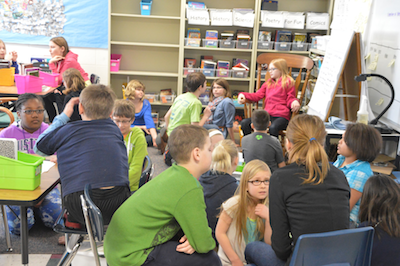 This student-driven approach to learning allows kids to explore what matters to them, to build things that don’t work and to figure out why. It requires them to form opinions and justify them based on solid evidence. And it requires adults who care and can speak carefully and honestly into the lives of kids.
This student-driven approach to learning allows kids to explore what matters to them, to build things that don’t work and to figure out why. It requires them to form opinions and justify them based on solid evidence. And it requires adults who care and can speak carefully and honestly into the lives of kids.
All learning should be formative. We talk a lot about formative and summative assessment. But why do we have summative assessment? To give a mark. To average up the test scores so kids can have grades for college applications. Grading should be abolished. In addition to being an arbitrary tool that we’ve fed an awful lot of power into, marks mean very little. What does 82 mean? Really. I’ve asked students that question. I’ve asked parents and other teachers, as well. No one really knows. Does it mean you don’t know 18% of the stuff? And which 18%. What if it’s the really important 18%?
I once broached the topic of abolishing marks with a senior administrator in my school division. The response was, “Do you know how big that is? Do you know how much work that would take?” Yes, I think so. But is the reason we don’t do what we know is best for our children because it’s too much work? Or is it more the politics?
Formative assessment allows kids to reflect on their learning and figure out how to create better. Why does something work? Why doesn’t it? What did we do well? Where can we improve? It allows for more experimentation and less judgment. It provides feedback that matters to students. Done well, it provides them a voice in the learning process. And it allows me to know, day after day, what my students can do well and where they need to improve. I’ll take that over 82% any day.
It’s true… if we slow down education, kids might learn less. But if we take the time and use it well, they will learn less about the things that matter least, and more about what matters most. Best of all, they will learn how to learn on their own. And then they can learn anything.
Right now, I truly question whether most students are learning anything other than how to “do” school, or that they’re not “academic.” If we get serious about slowing down education, however, we have the possibility of educating kids in a way that helps them to develop into people who are happy, healthy and humane.
How do we build a Slow Education movement?
✓ We abolish the busy, controlling, aggressive, hurried, analytical, stressed, superficial, impatient, quantity-over-quality education environment that prevails today.
✓ We educate parents and communities about the risks of today’s current model, including the drawbacks of “edubusiness.”
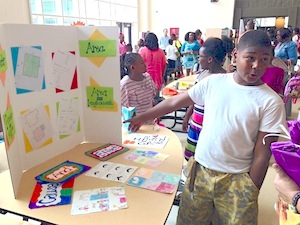 ✓ We create learning environments that are carefully crafted, receptive, still, intuitive, unhurried, patient, reflective, quality-over-quantity and engaging.
✓ We create learning environments that are carefully crafted, receptive, still, intuitive, unhurried, patient, reflective, quality-over-quantity and engaging.
✓ We develop curriculum that has greater depth than breadth.
✓ We make sure our curriculum takes into account local culture and celebrates the uniqueness of our local community.
✓ We don’t isolate skills development but let students grow their skills as they engage with important content.
✓ We construct learning environments that foster questioning, creativity and innovation, such as the maker movement and project/problem based learning.
✓ We find the courage to have serious discussions about abolishing standardized testing, classroom marks and grading, and the use of “birth year” as our primary criterion for sorting students.
✓ We lobby our governments for funds to assure true equality in education for all children.
✓ We discontinue the ranking of teachers and schools.
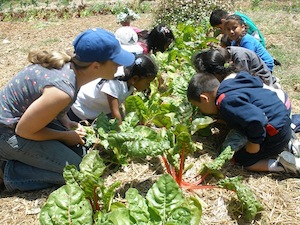 ✓ We replace our egg-carton grades with flexible, personalized learning that takes into account when students are ready to engage in and acquire important skills.
✓ We replace our egg-carton grades with flexible, personalized learning that takes into account when students are ready to engage in and acquire important skills.
✓ We make time for teacher collaboration a top priority.
✓ We expect all classrooms to connect students globally so they can learn from others around the world and apply what they learn in their own communities through meaningful projects and service.
✓ We make student voice and choice an integral part of everyday teaching and learning.
For me the question isn’t who will let us – the question is who will stop us? It’s time to do what is best for students. It’s time to do what’s best for teachers. It’s time for a grass roots movement that comes together to change the tide. Are you ready?
Shelley Wright
Latest posts by Shelley Wright (see all)
- Start with Why: The power of student-driven learning - May 8, 2019
- Are You Ready to Join the Slow Education Movement? - August 26, 2014
- Academic Teaching Doesn't Prepare Students for Life - November 7, 2013


Thank you! Or should I say Amen 🙂
I am sure crafting this article was time consuming and totally engrossing. A perfect slow reflection. I hope it reaches a broad audience.
Thanks! This has actually been one of my favourite pieces to write. I, too, hope it reaches a lot of people, so that we can begin to rethink what education is, and create something that really nurtures our kids. Thanks for reading!
When I saw the expression “slow medicine” I thought of Montessori Education, Waldorf and home schooling which has been around for a long time and follows the same principles as the slow education movement. To be successful I would recommend retraining teachers so they experience a real transformation in order to unlearn education that does not honor the individual child. It also needs to be done slowly.
This is exactly what we need. I am making the changes in my classroom and with my own children. Yes. Yes. Yes
Slow education movement…I love both the name and the idea. As a retired teacher with 38 years of classroom experience, I am deeply troubled by what our public school system is doing to children and their teachers. I don’t know if we’ll ever be able to un-ring the bell, but the curriculum itself needs a major revamp. I believe we should take another look at developmental readiness and hold off on formal reading and writing instruction as some European countries do. Kids who are five and six years old need lots of time to build with blocks, listen to stories, paint, talk, and play.
I’m in! About to homeschool my son because we were not happy with the conveyor belt curriculum of his (private) local school. I don’t like the term homeschool and I’m really not happy with the notion of replacing one rigid environment for another. “Unschooling” isn’t an accurate concept either. But i love the idea of “slow schooling”. Every child deserves that.
Comment
Irma, I, too, have thought about homeschooling my own kids. At this point, we’re not, but my 9 year old begs me to every so often. I think there is great hope for change, but I think it will require both teacher and parent pressure for changes to occur. It’s too easy to maintain the status quo. Good luck to you and your adventures in slow schooling!
I homeschool my children for many reasons, but your article is one example. We don’t even use curriculum with our homeschooling. We use the library and do more unit study style where we delve into quarterly subjects. Lots of reading and exploring. We are involved in the community, lots of field trips, very organic learning experience. The other point I wanted to make is one of the big reasons we feel the need for public schools is for the kids to have somewhere to go while the parents are at work. In my opinion, homeschooling is still the best option (and Biblically supported), but because we live in a FAST society, both parents have to work to keep up with the Jones’s and so kids have to be somewhere during that time. If we slowed down, allowed traditional (and Biblical) roles to come back (mom at home, dad at work) and children taught at home, I think we’d see a whole different generation come to life! Unfortunately, the devil has done such a good job of demonizing this way of life making it seem “archaic” to the point that it may never go mainstream again. I LOVE your ideas on how to change the classroom to reflect a more organic experience and I pray it will catch on!
Dear Shelley,
Thanks for writing and posting this article. Aurora School in Oakland joins you in the “Slow Education Movement”. We actually have a parent at our school that has always described Aurora as the “Slow Education Movement” much like the Slow Foods movement.
We hope you can one day visit our school!
My best,
Abbie Koss
Executive Director
Aurora School
Great post, Shelly. A movement against standardization and race to nowhere is just what we need.
I imagine that your piece conjures up a variety of images for people. If you and your readers want to take a peek at one expression of a “slow school,” check out http://opalschoolblog.typepad.com and let us know what you think.
Matt
Interesting ideas!
I’ve read and re-read this a few times and still don’t understand what “Authentic Education” is. I see what it’s not. I see what it allows. But I don’t understand what it is.
Help?
Worksheets are not authentic work. Instead, it’s work that you see everyday Pythagorean theorem is actually used to build things, not just a formula on a sheet. Here’s an example of real life learning in my own classroom. https://www.youtube.com/watch?v=3fMC-z7K0r4
This is a great article. Are you familiar with Montessori education? This educational philosophy and method and understanding of how children develop and learn best has been around for over 100 years. There is an increasing body of research that provides the evidence base for its success. It’s teachers are specially educated in accredited Teacher Education Programs by the Montessori Accreditation Council of Montessori Education, recognized by the USDE.
This is the “Slow Movement” in action and serving thousands of children and their families in both private and public schools.
Thank you.
Comment
I think Montessori is an incredible way for kids to learn. Unfortunately, too often it’s only used with our youngest students, and yet, I think it has so much potential for our older students to explore their world.
Shelly, thanks for putting this together so elegantly. As I’ve been thinking about similar ideas from the perspective of higher education, I’ve thought about some of my influences including the books “Small is Beautiful” and “Zen and the Art of Motorcycle Maintenance”. The concept of “slow” fits in beautifully.
I, too, have read Small is Beautiful. It was one of the books that was influential in our decision to downsize our life and possessions, and to buy only a house that was the perfect size for us. Eventually, that spilled over into my thinking about education, where we often think bigger is better. Not so. Often less is more.
I, too, recognize Montessori (and Waldorf) as fitting into your description of “slow” education.
However, some Montessori schools do get caught up in the “fast” culture, in part because they want to please the parents who are they themselves caught up in the Bigger, Better, Faster, More, Now! culture. “Simplicity Parenting” by Kim J. Payne addresses this issue.
Another reason to want to slow down is to help those children who are introverted. Susan Cain writes about this in her book “Quiet.”
I love the book Simplicity Parenting. I spent last summer learning all I could about simplicity, which led to this summer learning about slow. I love Susan Cain’s book, partially because I am an introvert, but also because I have two young daughters. One is like me, an introvert, and the other is like her father, an extrovert. For us, it’s been learning about how to value both personalities, Slow and simple has helped us to do this.
I think you bring up a really valuable point, society, and consequently so many parents, are caught up in fast. We need to do our best to educate how this can hurt kids and what is best for them instead.
“The 59th Street Bridge Song (Feelin’ Groovy)”
Slow down, you move too fast.
You got to make the morning last.
Just kicking down the cobble stones.
Looking for fun and feelin’ groovy.
Hello lamppost,
What cha knowing?
I’ve come to watch your flowers growing.
Ain’t cha got no rhymes for me?
Doot-in’ doo-doo,
Feelin’ groovy.
Got no deeds to do,
No promises to keep.
I’m dappled and drowsy and ready to sleep.
Let the morning time drop all its petals on me.
Life, I love you,
All is groovy.
Slow Food, Slow Learning…why didn’t I make that connection! Well done Shelley. I’ll be sharing this one around.
Thanks, Joel!
Hi Shelley. I am thrilled to read this. I blog about education and I was a teacher using the Reggio Emilia philosophy. I was only saying to my husband that we need a slow education revolution , a groundswell at grass roots and your blog miraculously appeared on my Facebook tonight. Wow! My blog is new but I have big plans. Podcasts and already I have started interviewing people who are change agents in education. I would love to talk to you and maybe do a podcast together. I really look forward to hearing from you. Bella Carter
I know a number of early elementary teachers who use the Reggio philosophy. I only wish it would continue much, much longer into their education. I would love to have a conversation with you about changing education. Feel free to contact me at my blog at Wrightsroom!
Your post is far reaching … massive thanks coming to you from the Sunshine Coast Qld Australia … education certainly needs the changes you speak of … thank you for articulating them so well!
Personally (and publicly) I have coined a phrase: ‘rush to implement,’ which aptly describes our federal, state, and district political systems enacting Race to the Top, Common Core, and Big Data Assessments. People without much background in Learning Sciences are influenced by big money and trying to solve a problem that they don’t understand. Unfortunately, they are also under the influence of a failing textbook business that has been disrupted by new technologies.
Yes, yes, and yes! Thank you Shelley for this important piece and I wholeheartedly agree. I’ve shared your post on my Educational Psychology & Technology collection: http://www.scoop.it/t/educational-psychology-technology
Also, I think your approach is extremely important to consider as we see the rapid proliferation of corporate charter schools in our communities. These efforts are often blinded-by-the-bottom-line and adopt many of the same efficiency/control/profit-driven philosophies that dominate business and corporate cultures. Here is a collection I’ve gathered to raise awareness: http://www.scoop.it/t/charter-choice-closer-look as well as another one on the high-stakes testing: http://www.scoop.it/t/testing-testing
Finally, there are clear parallels with the issues you’ve raised and this video showing the pitch of junk food marketing to kids: http://sco.lt/4s1nfN. Healthy eating and healthy learning go hand in hand and as you’ve noted, there is great value in returning to slow, authentic, healthy, organic, and genuine approaches. We are what we eat, and we become what (and how) we learn! Thanks again and look forward to reading more and staying connected. – RM @ConnectEdProf
Thank you for these terrific resources. I think corporations and their charter schools see our children as one thing, a product. Personally, I find that offensive. The more parents are educated, the greater the movement against harmful schooling practices will become. Looking forward to reading the links you’ve provided!
I’ve taught since the mid-eighties and have seen many movements come and go…. I keep thinking to myself, we are living to be older ages than ever before with improved healthcare, and we now know the brain isn’t fully developed until age 22. Why the push to get kids in school at such an early age? (Childcare) Why can’t we bring back the play: painting, using legoes, blocks, playing with dolls and cars, coloring, etcetera? We should be having children enter formative school at later ages, when they are more developmentally ready. (Piaget knew what he was talking about.) Isn’t the age in New Zealand 6 for girls and 8 for boys, when entering schools. I bet the boys have less problems!
Exactly. It’s interesting how much kids really learn about the important things from play — even the big kids. There are a number of countries who aren’t in such a rush, and they’re much better off for it.
I enjoyed your piece. I was in line with what we were trying to do with the PlayMaker School program in Santa Monica, CA. If you want fast, just tell kids what to regurgitate and have them give it right back to you. Real learning, inquiry, collaboration, play, exploration, and creativity take TIME. Kids deserve an education focused on their experience and their (individual) futures!
Ah! That’s what’s wrong with me! I am a practitioner of slow education. I should have realized there was a term for stopping to tie someone’s shoe, finding just the right book, or asking, “Why do you think so?”
What you’ve written is spot on!
I am heartened by your article, your accessment, observations, and solutions. My three children went to the Waldorf school, it had many flaws, but fundamentally has the right idea..integrated learning, merging art,drama, movement learning. Keep up the good work. And thank you for all that you’re doing to wake people up…slow down and enjoy the journey.
I think anything we come up with will have flaws, but Waldorf is another way of schooling that has so much going for it. It’s something I wish my daughters could experience!
That is the reason I started homeschooling.
Its a very good article. Thank you.
HI Shelley, thanks for this perspective on education. It’s refreshing and a number of teachers I know would probably voice a resounding”amen” to what you say here if not for fear of reprisal in their school district. I don’t know if anyone else has mentioned this aspect of the current FAST model of education, but I know that as the mom of a son with Autism, I am beyond frustrated with the “common core” standards adopted by most states in the US. It is already proving to be a “dumbing down” of our education system, if that were possible, and if that is true for the”neuro-typical” kids, you can imagine how it is for the special education students. I have to tell the most all at IEP mmetings, Do not teach him how to do a math problem using circles with X’s inside, or draw 25 boxes with 4 little dots in each…just show him how to write a regular math problem, how to solve it, and how to read and solve a word problem. That’s just an example. I get a cross eyed look as soon as I announce I am not a fan of Common Core, but I want them to know from the start I have different expectations and “presenting” the information , not teaching it, is not an option. I’ve had to work on projects and experiments for my son that he was required to do that No Child his age should be expected to do. I know that the other parents did the same, and the sad part is, so did the teachers. ..but the school got to check that box off as completed. No one learned anything.
Homeschool is a great way to Slow Education. Thank you thank you for having the vision! Thank you for your grassroots movement to really reform our schools! Our children NEED this desperately! Have you seen the Finland Phenomenon (YouTube) ? 4 hours of school in elementary! 90 minutes of recess! No homework! No tests! Whole life skills! Why isn’t this the US model??? Kids start school at 7 or 8!!!!! For some more grassroots stuff check out a whole months conference starting Monday the 8th of September . Free, from the comfort of your own home. http://hecoa.com/not-back-to-school
Nice set of ideas; ought to be applied to every aspect of life through education. Now that’s what I call ‘authentic education’ – where school teaches you how to live well by actually allowing you to turn your interests into useful contributions, at your own pace- so you could make a steady transition out of education to work with education. But I’m afraid that will remain a pipe dream while our ecosystems are sacrificed on the altar of neo-conservative economics where the only thing that matters is more consumption for me, now.
That is the same reason we can’t seem to get started on de-carbonizing our economies – we know we should, indeed we have no choice – but while profits are high and taxes and regulations are low, we will never be able to break the addiction to greed and speed.
So if you want this wonderful slow, sensible, satisfying, sustainable world instead of a polluted, putrefying planet, you’re going to have to attack the heart of the problem – rewarding greed.
Shelley, I can’t tell you how much I appreciate this article…am sharing it everywhere. I am a long time homeschooler….30 years….and when we began, there was so much of this mindset. Now so many are simply trying to recreate the fast paced, intense environment of the public system in their homes. Everyone talks about curriculum, no one talks about the joy of learning! Thanks for another article I can share to challenge this thinking!
Thank you so much for this article! I am a teacher for a public charter school, and I completely agree with you! It’s why I can’t, in good conscience, send my own children to school. My son is the kind of kid who is a wanderer; naturally slow, pokey, but picks things up when he’s ready and VERY QUICKLY at that! He unfortunately would not fit very well in a public school.
Like I said, I am a teacher; and I find that this fast-paced “education” is stressing me out too! We’re asking students to do more and more, and teachers end up with more and more work and expectations-many of which could be likened to the dreaded worksheet-worthless work.
I work with elementary students who have “fallen behind” in math. I have found many of these children are simply stressed out and don’t even know how to learn. My question is how would your “slow-education” look in a classroom? I would love to see a follow-up; maybe a week in the life of a “slow-educated” school student example? Thanks again for your article! I feel it articulated much of what I have seen and believe about education! 🙂
Where do I sign up? Quickly, because our students must be ready for another standardized test next month.